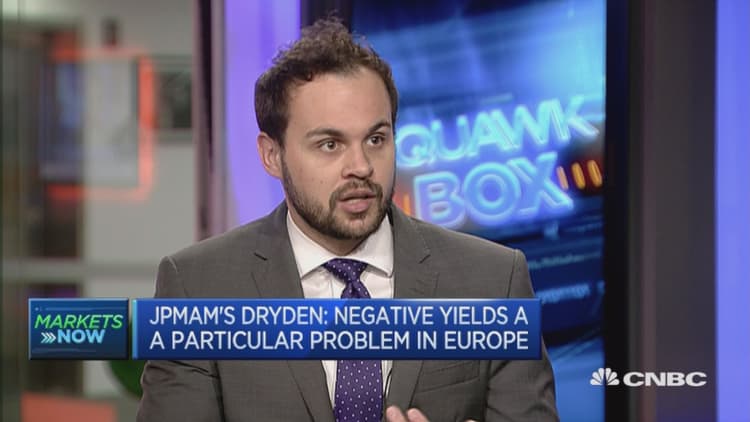Markets are currently riding on the wave of uncertainty and speculation over whether the world's central banks will continue to pump in more and more cash into the economy though bond-buying programs known as quantitative easing (QE). But as we go deeper into the world of easy money from central banks, there are other areas of the economy that could see a knock-on effect.
Alberto Gallo, head of macro strategies and manager of the Algebris Macro Credit Fund, describes this paradox as "QE infinity," whereby low rates and seemingly endless rounds of bond-buying programs encourage cheap borrowing, and investment in financial markets -- but not in the real economy.
"The problem is rising debt and monetary easing comes with many collateral effects. One is the distortion of asset prices, leading to asset bubbles," Gallo explained on his website.
"Asset price distortion also has a ripple effect on wealth distribution, increasing inequality by benefitting the already-wealthy who are more likely to hold financial assets. Over time, low rates and QE can also encourage misallocation of resources to leverage-sensitive sectors, including real estate and construction."
Gallo further explained that for the global economy to exit this QE infinity trap, government action and reforms to improve productivity are needed.
"But many governments are reluctant to accept the need for these measures, often instead implementing policies that win votes but compound the distortions of easy monetary policy e.g. housing affordability programmes, mortgage subsidies."
Without an adequate fiscal response from governments, growing imbalances make it harder to withdraw stimulus, warned Gallo.
"This is the paradox of current monetary policy: On one hand, it is the best possible response available to central bankers. On the other, it has long-term collateral effects which need to be confronted eventually."
No exit plan?

Central banks have seen themselves come up with new ways of stimulating the economy ever since the world plunged into financial crisis in September 2008. Data from JPMorgan shows that the top 50 central banks around the world have cut rates 672 times between them since the collapse of Lehman Brothers, a figure that translates to an average of one interest rate cut every three trading days. This has also been combined with $24 trillion worth of asset purchases.
This raises a big question: Will the global economy ever exit QE Infinity?
An increasing number of analysts and policymakers have shown concern over the state of the global economy due to a continuous state of unorthodox monetary policy.
Earlier this year, the outgoing Indian central bank governor Raghuram Rajan expressed concerns over infinite quantitative easing and referred to it as an "unstable situation."
Speaking to Bloomberg TV India, he said either the world economy needed stronger growth or recognized the limits of monetary policy have been exhausted and slowly go back to normalcy across the world.
Monetary meets fiscal
But how much further can the banks go now? Analysts have started to worry whether central banks might soon run out of options and look at fiscal plans for support. But some analysts say this is already happening in Europe.
"At the macroeconomic level, interestingly monetary policy is becoming more and more associated with fiscal easing," Vincent Juvyns, Global Market Strategist, JP Morgan Asset Management told CNBC via email.
He cited the example of the European Commission that continues to implement its infrastructure plan, which reached the 100 billion euro ($112.8 billion) mark in June and will be extended. "The government austerity period is also clearly over in most member states and we can see that in aggregate, European governments are again spending more."
However, it is not enough as many analysts claim especially as the global economy is slowly getting sucked into the world of ultra-low interest rates and infinite amounts of QE. While this has helped stimulate growth, it has also created a tough trading environment with all-time low yields for investors.
"QEs have distorted the fixed income market. By continuously pushing asset prices higher and yields lower, economies and markets have become increasingly reliant on these accommodative measures," Morgane DelleDone – Associate Director, Fixed Income Strategist at ETF Securities told CNBC via email.


